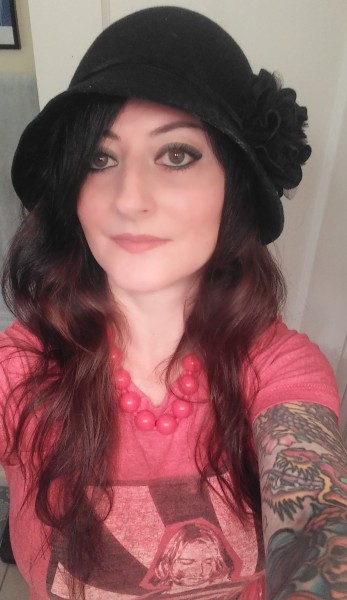
In SmokeLong‘s “Why Flash Fiction?” series, flash fiction writers and editors explore what draws them to the form. In this column, Hillary Leftwich explores how her son’s epilepsy has informed her fiction. Submit your own “Why Flash Fiction?” article or other flash-related essays on our Submittable page!
By Hillary Leftwich
Ten to fifteen seconds. The average time of a seizure. Enough time to cause brain cell death. Enough time to affect learning and memory. Enough time to cause death.
My son has suffered from seizures since he was a baby. I didn’t know what they were. His face would twitch and his eyes would move left to right, right to left. His pediatrician always gave him a clean bill of health. When he was two years old he suffered a generalized tonic-clonic seizure or grand mal seizure. He was visiting my friend and her children in Colorado Springs for the day and I was doing laundry in my apartment in Denver. The phone rang and I answered. The man on the other end of the phone told me: “This is the fire department. Your son stopped breathing. We had to resuscitate him. We are taking him to the hospital. If you’re driving down, whatever you do, don’t speed.” I jumped in my car and immediately started the 45-minute drive from Denver to Colorado Springs. I must have been going 100-120 miles an hour. Enough time to dry half a load of laundry. Enough time to consider every horrific scenario of what was happening to my son. Enough time to make the drive in thirty minutes. Years later, I wrote my first flash fiction story called “119 MPH.” This is how I became a flash fiction writer.
I was introduced to flash fiction during my master’s program. Except it wasn’t called flash fiction. I knew it as micro fiction. Or sudden fiction. Or postcard fiction. My professor in creative writing during that time, Marty McGovern, told me he didn’t care what it was called as long as it was under 1,000 words and contained all the elements of a story. Easy, I thought. The end result was a sorry attempt at a flash fiction piece that my dear professor sent back with a note stating: “I don’t think you understand what micro fiction is. Please read the assignment again and revise this piece.” I dug my heels in, determined to figure out the genre that was eluding me. Like every other assignment I was faced with during my master’s program, I decided to research it. I went online and found every journal that published flash fiction I could find. I kept a log of every flash writer published in these journals, along with their flash pieces. I read every story I could locate by that writer and read those, too. During my research, it was inevitable I found myself reading Kathy Fish. Almost every journal I stumbled upon had a Kathy Fish story. The first story of hers I read was “Warrior” in Alice Blue Review. It is precisely 115words. For weeks afterwards I couldn’t get the final lines out of my head: “She regards him with a terrible precision. ‘You are my brilliant boy,’ she says.” This resounded. This did not tie everything up nicely. It was an unanswered question. I knew everything I had written up until that point was about to take a completely different direction.
There’s an article in The Review Review by Becky Tuch called “Flash Fiction: What’s it all About?” Some of the best editors and flash writers such as Mark Budman, John M. Cusick, Stace Budzko, and Tara Masih offer their advice on the world of flash writing. My favorite insight comes from Grant Faulkner, editor of 100 Word Story: “The joy of flash fiction as a writer and a reader is found not only in the words of the story, but in what is left out–the absences can be almost spectral, haunting what’s been told, only guessed at.” There’s a Twilight Zone episode, or maybe it’s from Scary Stories to Tell in the Dark, about a missing puzzle piece. Two characters—perhaps a husband and wife—find an old puzzle in a bookstore, or maybe from an old trunk in the wife’s grandmother’s attic—the details aren’t important. The puzzle’s box has no front picture to tell you what the image will be. So, husband and wife get bored one night and decide to start putting the puzzle together. The longer they keep at it the more they start to realize that the scene is very similar to their own living room. The man and woman in the puzzle look very much like themselves. There is something terrifying outside the living room window. In the end, they can’t find the final puzzle piece, but they won’t know what is outside the window until they do. That missing piece is everything in flash. The tension should just about kill you.
Three years after my son’s first known seizure, I found myself living in a hospital room in the children’s intensive care unit. The cause of my son’s seizures was still unknown. He was comatose, for the most part, and not likely to survive. He was diagnosed with a series seizure disorder with an unidentified cause. What Faulkner said about flash fiction was proving to be true to my own life. My son’s diagnosis haunted me. Not knowing if he would recover drove me to the point of hysteria. By our second night in the hospital, a patch of my son’s hair had turned gray from the stress. Six days under the care of the neurology department and my son’s seizures were finally under control. By the time we left the hospital my son was alive, but he could barely walk and his speech was slurred. But he was alive. During this time, I was completing my final semester at CU Denver for my undergraduate degree. I returned home with a broken son, a pile of homework, and over a week absence from my job to catch up on. My son recovered very quickly. He began a series of medications that were able to control his seizures. I was told children are more resilient than we think. Eventually, I began to reorganize my life much as I would a flash fiction story: I started at the point of action and focused on a single moment in time. I didn’t allow myself to become overwhelmed by too much detail. I kept everything short and sweet. I realized the impact of all the unknowns in my life. The possibility—even today—of losing my son to epilepsy. How frightening and yet how important the absences in our lives can be.
Thirty minutes. Enough time to make dinner and feed my son. Enough time to do half a load of laundry. Enough time to have my son read “Willy Wonka and the Great Glass Elevator” up to chapter three, right when they are hurdling through space. As a single mom, time is always elusive to me. Is there ever enough time? Probably not. Raymond Carver once said, “Write what you know, and what do you know better than your own secrets?” The same holds true for our writing lives. Our experiences, good or bad, are the heart of our writing. And let’s face it, the wicked moments—the times when you want to punch something (or someone) and curse everything, those are the moments we die for in writing. Those are the moments are hearts ache for when we read them. One piece of flash is never the same as another. There’s no pinning flash down, and that’s what is so mesmerizing about it. Flash fiction is the lover you never get bored with. The affair is unending, always changing, always thrilling over and over. How can you not fall in love with it?
 Hillary Leftwich resides in Denver with her son. In her day jobs she has worked as a private investigator, maid, and pinup model. She is the associate editor for The Conium Review and Reader/Marketing Coordinator for Vestal Review. Her writing has been nominated for a Pushcart and appears in a number of journals including Hobart, Matter Press, WhiskeyPaper, NANO Fiction, Monkeybicycle, Dogzplot, Cease, Cows, Pure Slush, FlashFiction.net, Gone Lawn, The Airgonaut and others. You can find her at https://hillaryleftwich.contently.com/ or follow her on Twitter @HillaryLeftwich.
Hillary Leftwich resides in Denver with her son. In her day jobs she has worked as a private investigator, maid, and pinup model. She is the associate editor for The Conium Review and Reader/Marketing Coordinator for Vestal Review. Her writing has been nominated for a Pushcart and appears in a number of journals including Hobart, Matter Press, WhiskeyPaper, NANO Fiction, Monkeybicycle, Dogzplot, Cease, Cows, Pure Slush, FlashFiction.net, Gone Lawn, The Airgonaut and others. You can find her at https://hillaryleftwich.contently.com/ or follow her on Twitter @HillaryLeftwich.

 The core workshop of SmokeLong Fitness is all in writing, so you can take part from anywhere at anytime. We are excited about creating a supportive, consistent and structured environment for flash writers to work on their craft in a community. We are thrilled and proud to say that our workshop participants have won, placed, or been listed in every major flash competition. Community works.
The core workshop of SmokeLong Fitness is all in writing, so you can take part from anywhere at anytime. We are excited about creating a supportive, consistent and structured environment for flash writers to work on their craft in a community. We are thrilled and proud to say that our workshop participants have won, placed, or been listed in every major flash competition. Community works.